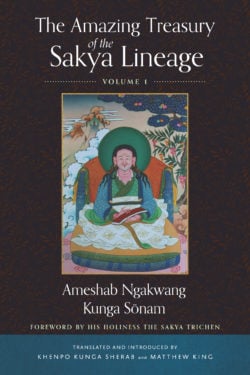Matthew W. King

Matthew W. King is Professor of Transnational Buddhism at the University of California, Riverside. A historian of Inner Asian Buddhism, his published work has focused on scholastic and tantric engagements with the Mongol Empire, biomedical modernity, the Qing Empire, humanism and Orientalism, and socialist state repression. His first book, Ocean of Milk, Ocean of Blood: A Mongolian Monk in the Ruins of the Qing Empire (Columbia University Press, 2019), won several awards, including the American Academy of Religion’s 2020 award for Best Book in Textual Study. His most recent book is In the Forest of the Blind: The Eurasian Journey of Faxian’s Record of Buddhist Kingdoms (Columbia University Press, 2022).
Books, Courses & Podcasts
The Amazing Treasury of the Sakya Lineage
A lucid and landmark translation that offers an intriguing glimpse into Tibetan history, the Mongol Empire, and the spiritual development and remarkable lives of the early luminaries of the Sakya lineage of Tibetan Buddhism.
In this first of two volumes of The Amazing Treasury of the Sakya Lineage, translators Khenpo Kunga Sherab and Matthew King capture a truly remarkable period in Buddhist and Asian history. Here, Ameshab Ngakwang Kunga Sönam (1597–1659), a member of the Khön aristocracy and the twenty-seventh throne holder of Sakya Monastery, offers a narrative that recounts the lives of numerous iconic leaders of the Sakya school of Tibetan Buddhism during the transformational period between the tenth and fourteenth centuries. This landmark volume reconstructs that long era of religious and political innovation and upheaval through the rise of the Mongol Empire.
In this book, you’ll see how Sakya Buddhist leaders emerged in this early period as translators, adopters, arbiters, and innovators of newly circulating Indian Buddhist scholastic and tantric cultures. In the thirteenth century, when the Mongol Empire forever transformed medieval Eurasia, leaders of the Sakya school became confidants and tutors to some of its most powerful leaders. The biographies of numerous Sakya luminaries are retold here, like Sakya Paṇḍita and Phakpa Lodrö Gyaltsen; along with their Mongol contemporaries, Köten Ejen and Qubilai Qaγan, these leaders laid the groundwork for forms of patronage, religious and political sovereignty, scholasticism and tantrism, and righteous rule that would endure for the next eight centuries down to today.

